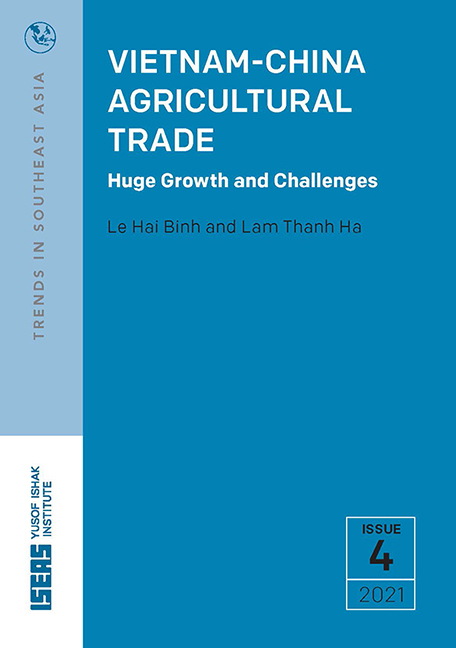Vietnam-China Agricultural Trade Huge Growth and Challenges
Published online by Cambridge University Press: 28 October 2021
Summary
OVERVIEW OF VIETNAM's AGRICULTURE EXPORTS
Vietnam's agricultural exports play a particularly important role in the country's development, by generating employment, improving the quality of life for its farmers, and promoting social stability. Leveraging its comparative advantages in this sector, the country has emerged as one of the nineteen largest agricultural producers in the world, and aims to be among the fifteen largest agricultural exporters by 2030.
Its agricultural exports have steadily been increasing since 2009. The country's state-budget export turnover from 2009 to 2019 reached about US$321.5 billion, growing at an average of 10.9 per cent. As shown in Figure 1, Vietnam's export turnover for agriculture, forestry, and fishery products went from US$15.3 billion in 2009 to US$41.3 billion in 2019 (2.7 times larger).
In 2019, Vietnam's total export turnover reached US$264.2 billion, of which 15.6 per cent were from agricultural products. Fishery exports achieved the highest values, followed by fruits and vegetables, cashew, coffee, and rice (Table 1). Agricultural, fishery, and forestry exports in the first 11 months of 2020 reached US$37.42 billion, up 2.4 per cent over the same period in 2019 (US$36.52 billion).
As of 2019, Vietnam's agricultural products have been exported to over 180 countries and territories. The largest among these markets are China, the United States, European Union, ASEAN, and Japan, in descending order. Together these account for 80.6 per cent of Vietnam's total agricultural export turnover.
The United States is currently Vietnam's largest agricultural export market, accounting for 26.2 per cent of Vietnam's total agricultural export revenue in the first 11 months of 2020. It is followed by China at 24.6 per cent. See Figure 2.
VIETNAM's MAJOR AGRICULTURAL EXPORT MARKETS
The European Union
Vietnam's tropical weather provide favourable conditions for agriculture, and the potential to produce and export agricultural products to other continents is enormous.
The EU is the second-largest import market in the world and also a big market for Vietnam. However, exporting to the EU is challenging due to the bloc's high-quality requirements, which can be a big obstacle for Vietnam's exporters. It is thus very important for Vietnam to properly assess its current production model and find the right strategies for agricultural production, to facilitate its exports to the EU market.
- Type
- Chapter
- Information
- Vietnam-China Agricultural TradeHuge Growth and Challenges, pp. 1 - 34Publisher: ISEAS–Yusof Ishak InstitutePrint publication year: 2021



